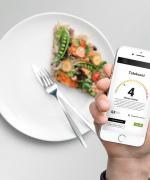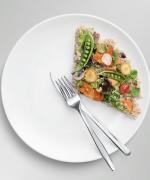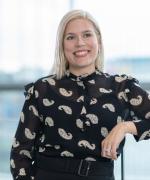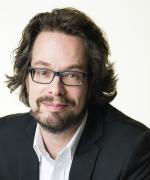
In Finland, an average family of four throws away up to 500 euros worth of food to waste every year* , and overall, about 500 million euros is thrown away each year due to food waste. Food waste is generated at all stages of the food value chain, and households’ share of the food waste is significant – at least one third, as indicated by research.
The amount of food waste is difficult to perceive, because at home, waste is usually generated gradually in small batches. According to Natural Resources Institute Finland, the causes for wastage include, in particular, inadequate planning, changes in everyday life and poorer cooking and household management skills. The CO2 emissions from the amount of food waste in Finland correspond to approximately 6,000 million kilometres driven by passenger car**.
“People buy too much food, don’t appreciate it enough and don’t know how, or can’t be bothered to, use food scraps to prepare other delicious foods. An easy way to use food scraps is to included them as an ingredient in, for example, omelettes, casseroles, pasta dishes, pizza, pies etc. The key, however, would be better planning. Moreover, too many people are confused about the labels on food packages, such as ‘best before’ and ‘use by’ date. In reality, up to half of food thrown away is still edible. The aim of the new calculator is to make consumers think before they act and so influence their habits and routines by making food waste something that is easier to perceive and measure,” says Juha-Matti Katajajuuri, Senior Customer Manager, Senior Scientist at Natural Resources Institute Finland (Luke).
At the first stage, the food waste calculator is intended for households, but later on, it could possibly be utilised by restaurants and grocery stores. In its current form, the calculator calculates not only the volume of household food waste, but also its climate impacts and value in money. “Many people may find it difficult to change their habits, particularly if they cannot perceive the problem properly. That is the reason why we included the financial aspect in the calculator alongside the amount of waste and impact on emissions. The calculator is not intended to make people feel guilty, but to encourage everyone to scrutinise their habits as consumers and thus contribute to coming up with a solution. The calculator could very well be used for example as a teaching aid in home economics lessons in comprehensive school,” says Kaisa Lipponen, SVP, Communications & Sustainability at Paulig.
Reduction of food waste an element in Paulig’s Sustainability Approach
Reduction of food waste is a part of Paulig’s Sustainability Approach 2030, which comprises more sustainable products and services, climate action and the circularity, and a fair and inclusive way of working.
Paulig’s aim is to cut the food waste in its value chain by 50% by 2030. A research project launched with the University of Helsinki is studying the generation of food loss in the upstream stages of Paulig’s value chain, and Paulig is constantly developing its operations and seeking new innovative solutions to reduce food loss and waste from its own operations.
The food waste calculator, now launched in Finland, is part of Paulig’s sustainability work. The project’s aim is to draw attention to food waste, provide tips on how to reduce waste, and help Finnish consumers assess the amount of food waste in their households. “As an international food & beverage company, reducing food waste is a primary goal for us, and we work constantly to reduce our food waste. Food is meant to be eaten. Food that ends up in waste is a total waste of resources, and causes unnecessary emissions. This is why we want to contribute to solving this global challenge and help make Finland the frontrunner in reducing food waste. We sincerely hope that this food waste calculator will inspire people in Finland to make sustainable everyday choices,” says Lipponen.
Students involved in the development of the food waste calculator
Paulig tested the food waste calculator together with Helsinki Think Company, the entrepreneurship society of the University of Helsinki and students of the university. Students from various faculties participated in testing the pilot version.
“It was a joy to see how enthusiastic and committed the students were in participating in the test period. The topic is clearly interesting and many students had monitored their personal food waste in advance, and considered the environmental impacts involved,” says Maiju Palosaari from Helsinki Think Company.
Try the calculator and read more: lessfoodwaste.fi/paulig
For further information, please contact:
Anu-Maaria Vaalama
Director, Corporate Communications and Brand
Paulig
+358 40 766 783
anu-maaria.vaalama@paulig.com
Juha-Matti Katajajuuri
Senior Customer Manager, Senior Scientist
Natural Resources Institute Finland (Luke)
+358 29 532 6219
juha-matti.katajajuuri@luke.fi
Paulig
Paulig is a family-owned food and beverage company, growing a new, sustainable food culture – one that is good for both people and the planet. Paulig provides all things tasty; coffees and beverages, Tex Mex and spices, snacks and plant-based choices. The company's brands are Paulig, Santa Maria, Risenta, Gold&Green and Poco Loco. Paulig’s sales amounted to EUR 920 million in 2020. The company has over 2,000 passionate employees in 13 different countries working around the purpose For a life full of flavour.
Natural Resources Institute Finland
Natural Resources Institute Finland (NRIF) is a research and expert organization that promotes sustainable use of natural resources and bioeconomy. NRIF’s researchers and specialists provide solutions towards the sustainable development of Finnish bioeconomy and the promotion of new biobased businesses. We at NRIF are building a society based on bioeconomy in co-operation with our partners. The sustainability and resilience of food systems and primary production, carbon cycle and footprint, circular economy, and food loss are examples of key research areas our organization focuses on. NRIF’s turnover is approximately 125 million euros and the organization employs almost 1 300 people.
Sources
* Natural Resources Institute Finland (Luke)
** Natural Resources Institute Finland (Luke)



